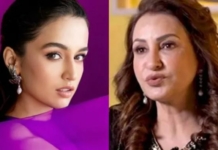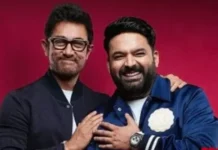If one were to describe the Karachi-born Dubai-based singer Schumaila Rehmat Hussain using one word, it would be ‘brave’; brave enough for stepping out into the music industry with a flair not only for singing but for composing as well, something very few women from our society have tried their hands at. The valiance is elegantly balanced by a calmness that characterizes Hussain as a person, also seeping into her songs, which thereby come forward as soft and soothing.
Hussain was born in Karachi and shifted to Islamabad at the age of four. After attending art school and spending a major portion of her life in the capital city, Hussain went to Dubai and got settled there to work on her craft and entice a group of nostalgia-stricken admirers of symphonized Urdu poetry who now love to listen to her. Minute Mirror got in touch with the sensitive singer, meticulous composer, and poetry admirer to ask a few questions.
When and why did you shift to Dubai?
I shifted to Dubai when I got married, but it also had a lot to do with art not being appreciated much in Pakistan in the late 90s and early 2000s. People focused less on your content and more on what you were wearing. As an artist, that conservatism was both discouraging and suffocating. In Dubai, I found that sense of security I had always yearned for; a space to know myself as a musician without bothering about what people think of my physical appearance. Having said that, I love my country and I do miss Pakistan a lot.
In which year did you professionally start your career?
A certain circle did know for me for quite long as a music artist. However, it was in 2010 that I officially released my first song.
In what way was it professional? Was it for some television or film project?
No, it wasn’t for television or film, but a single the kind we release on the internet these days. It was my first composition, in which a composer friend also had a part to play. We arranged it together and shot a proper video for it as well.
How was the response?
To be honest, the response was very good and I could have become commercially popular had I continued to produce songs in that genre. But, I was personally not satisfied with that kind of music. It was after having made that song that I had this moment of enlightenment, which told me that this is not what my real calling is, and I need to probe into my personality more to dig out what synchronizes with my disposition.
Was it at this point that you decided to shift towards classic Urdu poetry?
Well, I think I inherited a liking for poetry, for Faiz Ahmed Faiz was a very good friend of my father and he would visit our place often. The literary environment was very much there from my early childhood. In fact, it was Mirza Ghalib that I composed first, before I switched my focus towards Jaun Elia. It was for Sarmad Khoosat’s film Manto that I composed a few couplets by the great poet.
You have composed a lot of Jaun Elia’s work. Have you ever thought of making songs out of the poetry of some of our wonderful female poets such as Parveen Shakir, Fehmida Riaz, Noshi Gilani and Zehra Nigah?
I never categorize artists in accordance with their genders or birthplaces. Art, I believe, cuts across borders, physical and metaphysical. Therefore, I would never go for female poets merely for the reason that they belong to a different gender. All of them are respectable to me because their art is what inspires me. And yes, I would love to compose Parveen Shakir. Having said that, there are so many incredibly amazing poets out there that you cannot cover all of them even if you wish to. Composing poetry is easier said than done. First, a poet has to touch your heart. Secondly, you need to read a lot of that poet over and over again to understand his or her thought process. It is only then that you can do justice to the poet’s work. A systematic study, starting from the initial days of the poet’s career to the end is also required in order to understand the personality transition that went into making the poet’s work what it is.
In Pakistan, we may have a lot of inspirational female singers, but when it comes to music composition, we rarely come across names of women. Is it because of this dearth of women music producers that you took up composition?
When I started, I had no such thing in mind that I am here to fill a void. I was just following my dream to become a great musician. At times, I also wanted others to compose for me, but when that didn’t happen, I took up the entire responsibility myself. I would regularly listen to all the great music composers out there, such as Usha Khanna, R.D. Burman, Wazir Afzal and Vishal Bhardwaj. I also had to take care of the fact that my work doesn’t reflect the style of these people. While I had to listen to greats like these to learn, I also had to keep searching for my own voice as a musician.
What are some of your notable contributions to the music industry?
I did an OST for a HUM TV drama serial called Khamoshi along with Bilal Khan. It was one of those songs which succeeded in garnering millions of listeners and went on to become a blockbuster. Apart from that, my composition of Jaun Elia’s Kis Se Izhaar-e-Mudda Kijiye was taken up by ARY for a serial by Zafar Mairaj called Muqaabil. The same ghazal also got featured in the popular web-series, Churails. Apart from that, I mentioned earlier regarding my contribution for the film, Manto.
In your work, a fusion of western music and eastern classical way of singing is visible. According to you, which genre is it that you think is particularly yours?
The liquidity that is there in my personality resulting from my multiple migrations, makes my music a reflection of mixed experiences. From being born in Karachi and shifting to Islamabad at four and then spending some time in a music school in America, where we got to listen to both eastern and western musical giants, means my music cannot be characterized by a specific genre, and I don’t mind that. Fixity never suits art any way. It was when I finally settled in Dubai that I worked more and more, infusing all of my experiences in my works, venting out my nostalgia for all the places I spent time at, only to leave them.
You said that you carry a nostalgia for the past and for the places you have abandoned. Have you ever decided to let this nostalgia out by writing poetry by yourself?
I did write a song called Urr Jaa Re, and it went on to become a much-loved song. It gradually spread in various corners of the world, with laudatory comments pouring in week by week or month by month. That’s the kind of appreciation that I like; one that doesn’t sound artificial but slowly and calmly spreads everywhere, continuing to bring positive remarks from all over the world.
We mostly know Noor Hassan for being an actor and a host, but the star has directed a music video of yours. How did that happen?
Noor is one of my best friends. When Noor left Boom On Live on ATV, I took it up as a host, so we share that experience as well; of hosting one of the most popular music shows of Pakistan. I initially went there as a guest but the MD, Hammad Ghaznavi, asked me to host the show instead. An audition followed and I got accepted. As far as the music video is concerned, I had gone to Karachi for a few days. When I met Noor, he suggested to me to work on a video, and we thus chose Jaun Elia’s Kis Se Izhar e Mudda Kijiye. The story-line for the music video was quite spontaneous. Noor was teasing me and I went and sat in a cupboard to avoid him. The cupboard, fortunately, came to play a very important part to play in the video, signifying a haven, a comfort zone.
Who has been your inspiration throughout your musical journey?
There are so many of them; Norah Jones, Celine Dion, Mehdi Hassan, Madam Noor Jahan, Sukhwinder Singh to name just a few. Apart from these, I am a huge fan of Begum Akhtar. Even these days, I am frequently listening to her to have an in-depth understanding of her work.
Now that you have outgrown the concerns one has in the initial days of one’s career, do you think you will now be able to stand out amidst the limited number of female musicians?
Not yet. I still believe I have a very long way to go. Considering myself as an addition to an already short list still requires a lot of hard-work, for things still aren’t easier for women who wish to produce music. Until and unless you have a training in classical music, no one would want to have your take on how music is produced. You must have noticed how almost all of our popular female singers have had their respective ustaads (masters). So, you can never do it alone.
What are you currently working on?
I am working on music in Punjabi language. I also plan to release a short album comprising of not more than five songs. Apart from that, I gave music to a Yasra Rizvi film as well, which owing to the pandemic, still hasn’t made it to cinema halls. With the ban now lifted, I hope the film gets to have a screening soon. I have also done the OST for an upcoming drama serial on ARY called Koel, directed by my brother Yasir Hussain.
What message would you like to give to the aspiring female musicians out there?
In art, honesty comes foremost. Be honest with who you are, and spontaneous art will flow. Secondly, never compromise on craft, for talent alone cannot be relied upon. It has to be coupled with proper training in the craft and a designed skill-set for it to have the finesse art should have. Lastly, love yourself. Love yourself and see how beautifully it is reflected in your art.







